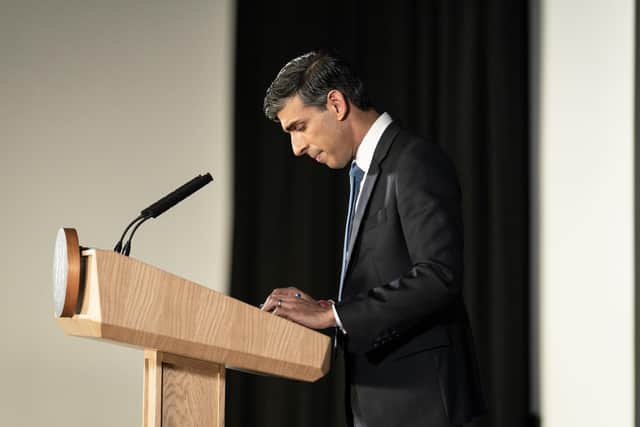The most rational thing we could do is to invest in the education of our people - David Blunkett
It is with this in mind that my thoughts today turn to the publication, just before Christmas, by the renowned Institute for Fiscal Studies (IFS) of their Fifth Annual Report into Education Spending in England.
Between 2010 and 2019, the IFS found there had been an 8 per cent real-terms cut in expenditure on education – around £10bn. For his many faults, Boris Johnson did, at least, recognise the unsustainability of this decline and from 2019, expenditure began to rise and recover some of that loss, with per-pupil spend in schools expected to revert to 2010 levels in two years’ time. This includes the recovery provision from the pandemic and the most recent budget announcement by Jeremy Hunt on November 17 last year.
Advertisement
Hide AdAdvertisement
Hide AdBut here's the thing. In the 1970s, although people now trash that era, education spend represented 12 per cent of total government spending. Last year this had fallen to a historic low point of 10 per cent.


If we contrast this with spending on the National Health Service this becomes interesting. Not least because of the state we’re in today and the genuine crisis in delivery of healthcare – irrespective of the recent outbreak of industrial action.
Back in the 1970s, government spend on healthcare was just over 9 per cent of the total. Today it is over 20 per cent. Whilst education spending as a proportion of government spending has fallen, expenditure on the NHS has more than doubled.
There are reasons for this. An ageing population, advances in both technology and prescribing; but also constant reorganisations and structural change, the latest of which is one of the unspoken reasons for the dislocation of the NHS’ performance as it tries to recover from the impact of the Covid pandemic.
Advertisement
Hide AdAdvertisement
Hide AdWhat has happened over the last quarter of a century for education and lifelong learning to drop so drastically down the national political agenda? The need for learning at every stage of our life has never been greater as we cope with enormous global change and the constant reshaping of the world of work – including the dual challenges of trying to become a net-zero economy and the evolution of artificial intelligence and robotics which will transform what we do and how we do it?
One staggering statistic is the prediction that the school population will drop by 700,000 between 2024 and 2031. The medium-term impact of this on the availability of the labour force of the future is self-evident. Even more reason, therefore, to equip those coming out of school and college with the highest possible level of readiness for the new digital era; and to fuel a dramatic shift in productivity to avoid the vacancies of today becoming the black hole of tomorrow.
Surprising, therefore, that the IFS statistics demonstrate that the 16 to 19-year-olds, and classroom-based adult learning has taken, by far, the biggest hit over recent years.
Spending from 2011 for 16 to 19-year-olds in college, the research indicates, fell by 14 per cent, and by a staggering 28 per cent in school sixth forms. This leaves spending on post-16 below the pupil spend in secondary schools. Unlike schools, there was no extra funding in the Autumn statement for post-16 or adult learning.
Advertisement
Hide AdAdvertisement
Hide AdSo much for Rishi Sunak’s pronouncements about the importance of 16 – 19 education and the teaching of maths. As Einstein pointed out, one definition of madness is doing the same thing over and over again and expecting a different outcome. That is why in my Learning and Skills Report, in October last year, I had called for a transformation of how we teach maths, and what we teach the 16 – 19-year-olds in preparing them for the digital age.
As for lifelong learning, the figure for college-based learning, as opposed to on-the-job, apprenticeship or short courses, will have fallen by an eye-watering 40 per cent.
Apprenticeship spending has been maintained at around £2bn, almost entirely due to the Apprenticeship Levy, a proportion of which has been clawed back by the Treasury each year since its inception, totalling £3.3bn. This is money that could, and should, have supported the nation through post-Brexit trauma, which has seen our trade with the rest of the world drop by 15 per cent, our growth fall into negative figures and been a major hit to the prosperity of the UK.
Just in case you feel, as clearly some Cabinet ministers do, that University spend has somehow put higher education in a privileged position, think again. Over the last 10 years the amount spent per student, in real terms, has dropped by £1,700. This is substantially because the student fee, in real terms, has fallen by 18 per cent.
Advertisement
Hide AdAdvertisement
Hide AdPerhaps I could leave this thought in the minds of those kind enough to read this column. The better educated you are, the healthier and wealthier you are. The better educated the population, the more prosperous the nation. Time, surely, to reappraise where we are going as a country and to acknowledge that the most rational – and in the long term, most beneficial – thing we could do is to invest in the education of our people.
David Blunkett is a Labour Party politician, and served as the MP for Sheffield Brightside and Hillsborough.